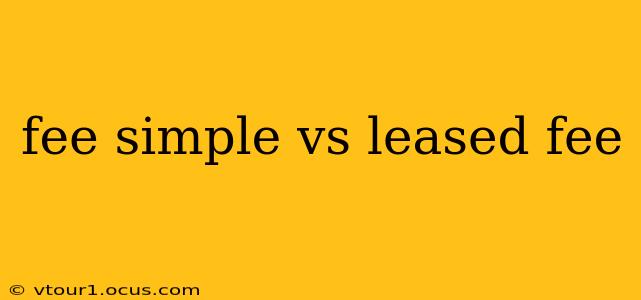Understanding the nuances of real estate ownership is crucial for both investors and homeowners. Two fundamental concepts often cause confusion: fee simple and leased fee. This article will clarify the distinctions between these two types of ownership, exploring their implications for investment strategies and overall property rights.
What is Fee Simple Ownership?
Fee simple, often referred to as "fee simple absolute," represents the highest form of ownership in real estate. It grants the owner complete control and possession of a property, subject only to governmental regulations such as zoning laws and property taxes. Essentially, the owner has the right to use, possess, enjoy, and dispose of the property as they see fit, including the right to sell, lease, or will it to heirs. There are no time limitations on this ownership. It's essentially outright ownership with unlimited duration.
What is Leased Fee Ownership?
Conversely, leased fee ownership refers to the ownership interest of the landlord in a property that's been leased to a tenant. The landlord retains ownership of the land and building, but the tenant possesses the right to use and occupy the property for a specified period, as defined in the lease agreement. The landlord receives rent payments in exchange for granting this right of occupancy. The landlord's interest is in the land itself; the tenant's rights are a separate entity.
Key Differences: Fee Simple vs. Leased Fee
| Feature | Fee Simple | Leased Fee |
|---|---|---|
| Ownership Type | Absolute, unrestricted ownership | Ownership subject to a lease agreement |
| Control | Complete control over the property | Limited control; tenant has occupancy rights |
| Duration | Unlimited, perpetual | Limited to the lease term |
| Income | Potential rental income (if leased out) | Guaranteed rental income (if leased) |
| Risk | Full responsibility for property expenses | Some risk; dependent on tenant's performance |
| Value | Reflects full property value | Reflects value minus the present value of the lease |
What are the Benefits of Fee Simple Ownership?
- Complete Control: You have the freedom to make any improvements or modifications you desire.
- Long-Term Appreciation: You have the potential to benefit from long-term property value appreciation.
- Inheritance: You can pass the property down to your heirs.
What are the Benefits of Leased Fee Ownership?
- Passive Income: Provides a steady stream of rental income.
- Lower Initial Investment: Often requires a smaller upfront investment than purchasing the entire fee simple interest.
- Potential for Appreciation: The underlying property value can still appreciate, increasing the value of your leased fee interest.
How Does Leasehold Interest Differ from Fee Simple?
Leasehold interest, often confused with leased fee, actually refers to the tenant's rights under a lease agreement. The tenant has the right to use and occupy the property, but they do not own it. This is different from the landlord's leased fee interest, which represents the ownership of the property subject to the lease. Leasehold interests are usually for a defined term, after which the property reverts back to the fee simple owner.
What are the Tax Implications of Fee Simple vs. Leased Fee?
The tax implications for fee simple and leased fee ownership differ significantly. Fee simple owners are responsible for all property taxes. With a leased fee, the tenant typically pays property taxes as part of the lease agreement, though the landlord might still have some tax liability depending on the specifics of the lease and local regulations. Consult with a tax professional for personalized advice.
What are the Risks of Leased Fee Ownership?
While leased fee offers potential benefits, it also carries inherent risks:
- Tenant Default: If the tenant fails to pay rent or vacate the property before the lease expires, it could negatively impact the landlord's income.
- Property Damage: The landlord is responsible for significant repairs and maintenance, even if caused by the tenant's negligence (depending on the lease terms).
- Lease Renewal: Negotiating lease renewals can be challenging, particularly if market rates have increased.
Understanding the distinctions between fee simple and leased fee ownership is paramount for making informed real estate decisions. Choosing the right ownership structure depends heavily on individual investment goals, risk tolerance, and financial resources. Consulting with a real estate professional can provide invaluable guidance in navigating these complexities.
